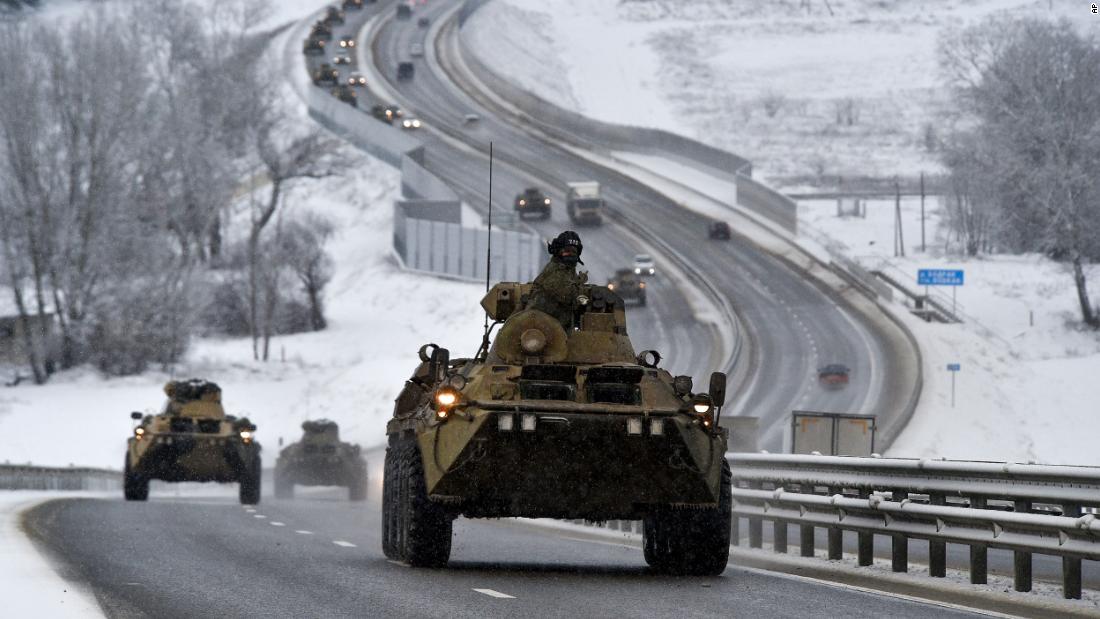NATO and Russia reinforce their deployments and tension increases in Ukraine 2:47
(CNN) --
Foreign forces armed to the teeth are heading toward the Ukrainian border.
Reconnaissance planes fly over the area.
Rumors of "false flag" operations spread like wildfire.
If you are watching state television in Moscow, you will see videos of troops and tanks, barbed wire and snipers taking aim, but it is not Russia's forces that are prepared for the attack, but NATO's.
Nuclear Weapons, Fighter Jets, and Warships: How the US and Russian Arsenals Compare
Welcome to Russia's representation of the confrontation in Ukraine.
In the country's alternative media landscape, NATO forces are carrying out a plan that has been in the works for years: encircle Russia, topple President Vladimir Putin, and seize control of Russia's energy resources.
According to Moscow's opinion, which is repeated in almost all the news and talk shows, Ukraine is a failed state totally controlled by the "master of puppets": the United States.
Europe is a weak and divided collection of lapdogs taking orders from Washington.
Even the United States, as threatening as it is, is also weak and torn by political division and racial unrest.
But wait a minute.
How can those powers be a threat and be weak at the same time?
That is one of the enigmas of Russian state propaganda.
Thinking things through is not what they are trying to encourage.
Rather they try to infuriate their viewers, and make them very afraid.
Russian state television's main political news program, Dmitry Kiselyov's "Vesti Nedeli" ("News of the Week"), began last Sunday with Kiselyov saying: "Instead of responses to the Kremlin's peaceful initiatives, we are being burying with accusations and new threats".
advertising
Any hint of disagreement between Europe and the United States or NATO is news in Russia, and one of the main topics on Kiselyov's agenda included comments from Germany's naval chief that Putin "deserves respect" and that the annexed Ukrainian territory of Crimea by Moscow, "he is gone forever".
The report ended with the note of satisfaction that the official had to resign.
ANALYSIS |
Biden Ramps Up Pressure as Putin Considers Ukraine Invasion
Ukraine may not be involved in a full-fledged invasion just yet, but there is already an all-out war of words in the Russian media.
The US government's statements are dismissed as "Information Ministry" comments, and Putin's spokesman, Dmitry Peskov, has accused Washington of "information hysteria", "lies" and "untruths".
And maps on Russian state television showing Russia's ally Belarus surrounded by NATO forces bear an uncanny resemblance to maps on Western media reports showing Ukraine surrounded on three sides by Russian troops.
Accusations of possible Russian attacks on Ukraine are dismissed as "mythological threats from Russia" or "Russophobia" from "Anglo-Saxons".
Tensions are high not because of Russia, the Kremlin says, but because of NATO.
In a stunning piece of mirror propaganda, Russian television has rebroadcast, with translation, the comments of Fox News pundit Tucker Carlson, whose cries against NATO and against US President Joe Biden align perfectly with the Kremlin line. .
"He [Carlson] should be on your show!" a Russian talk show guest told the host.
The barrage of state media seems to be having an effect.
A survey conducted in December by the non-governmental sociological research and polling organization Levada-Center showed that half of the respondents blamed the United States and NATO for the tensions, while only 3% to 4% blamed Russia.
The poll found that just over half of Russians believe the crisis in Ukraine will not escalate into a Russia-Ukraine war, with more than a third (39%) saying they believe war is "inevitable" or " very likely".
A quarter of those surveyed said they believe a war between Russia and NATO is possible.
In another Levada-Center poll, also from December, more than half of respondents (56%) said that relations between Russia and NATO have seriously deteriorated, the highest result since the conflict with Ukraine began in 2014. And more than half of those surveyed (56%) say they are worried there will be a world war.
NATO allies put their forces on standby and send additional warships and warplanes to deployments in Eastern Europe
Many Russians believe the West is dragging them into a war, according to a discussion group run by Riddle, an online magazine on Russian affairs.
"Russia will have to answer... They are squeezing us from all sides; they are biting us. What should we do? Give in?" said one of the focus group participants.
Meanwhile, Levada-Center pollsters say Russians are "mentally fatigued" by the Ukraine issue, which they say "seems to be imposed by the mainstream media."
As a result, viewers do not analyze the news or verify what they hear from TV show hosts.
There is no doubt that the Russian media landscape is changing as a younger generation turns to the internet to stay informed.
But most alternative media outlets in Russia have been shut down or banned, and the parallel reality of the Kremlin continues to dominate the media.
-- Jill Dougherty is a former CNN foreign affairs correspondent and Moscow bureau chief with experience in Russia and the former Soviet Union.
RussiaUkraine












/cloudfront-eu-central-1.images.arcpublishing.com/prisa/KMEYMJKESBAZBE4MRBAM4TGHIQ.jpg)


